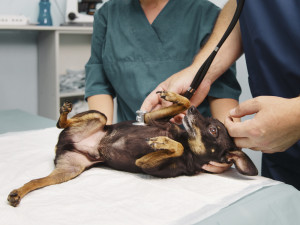A Rabies-Infected Bat Was Found In Pasadena—Here’s What Pet Parents Should Know
August and September are the most active months for rabid bats. Here’s how to keep your pet safe.

Share Article
Rabies is a dangerous, potentially fatal disease — and while the risk of infection to humans and pets remains low (so, don’t panic!), there are important safety precautions for pet parents to be aware of. Recently, a deceased bat in Pasadena, California, tested positive for rabies, leading health officials to warn residents about the dangers of the disease.
“Although there has been only one bat that [has] tested positive for rabies so far this year in Pasadena, there is the potential for additional rabid bats in the area,” Dr. Ying-Ying Goh, the Pasadena public health director, said in a statement.opens in new tab “In LA County, the only animals known to routinely carry rabies are bats.”
The activity of rabid bats is typically highest in the summer and fall — especially August and September, reports the County of Los Angeles.opens in new tab According to LA County’s estimates, about 15 percent of bats in LA County test positive for rabies while only one percent of bats in nature carry rabies.
While rabid bats are a particular concern in Los Angeles County, rabies infections are a problem across the country. This summer, rabid animals have been found in Coloradoopens in new tab, Ohio,opens in new tab New York,opens in new tab and many more states, infecting animals from bats to beavers to puppies. Regardless of where you live, rabies precautions should be on your radar.

How to keep pets safe from rabies
The Pasadena Public Health Department adds that, despite the presence of rabid bats, the risk of rabies to humans and pets remains low. That said, rabies can cause serious problems if contracted; pets with rabies can experience behavioral changes, paralysis, difficulty swallowing, seizures, coma, and death. The good news: There are ways to protect yourself and your pet from the disease.
Vaccinate your pet.
The most important way you can protect your pet from rabies is by vaccinating them. In most areas of the United States, it’s required by law to vaccinate dogs against rabies. “It’s vital to keep your dog up to date on their rabies (and other) vaccinations so that they’re protected from potentially deadly diseases and don’t pose a danger to other dogs and people,” veterinarian Dr. Bartley Harrison wrote for us.
Your veterinarian can give your dog a rabies vaccination; this is usually part of their general preventative care, and the cost varies. Rabies vaccines can begin to be administered after your puppy is three months old. After they get their first vaccine, pups are required to get a booster every one to three years.
Alternatives to veterinary care for rabies vaccines include vaccine drives at animal shelters or schools, vaccine clinics at pet stores, mobile vaccine clinics, or pet community health practices.
“These options can be convenient for pet parents that need a lower cost or less time-consuming option to keep their dogs healthy,” Dr. Harrison advised. Your local animal shelter is the best place to get started for a recommendation for a low-cost rabies vaccine.
Know how to spot a rabid bat.
For the safety of yourself and your pet, keep an eye on any bats you come into contact with. “Bats with rabies are more likely to fly in daylight, appear on the ground, or be found resting for long periods in highly visible areas, such as on the side of a wall,” LA County warnsopens in new tab. Bats that are unable to fly or easy to approach may also be sick with rabies.
If you see a sick looking bat, you can report it to your local animal control for testing; if the bat is not moving or dead, you can approach it to cover it with a bucket before doing so. Never touch a bat with your bare hands.
Know when to seek medical care.
Rabies is transmitted by the bite or tooth scratch of an infected animal. It can also be transmitted by saliva, if the saliva gets into a person’s eyes, mouth, nose, or wound. Rabies is not transmitted by blood, urine, or feces.
“If you’re bitten or scratched by a bat, wash the wound with soap and water and get medical help right away,” the Centers for Disease Control (CDC) advises.opens in new tab “If bat saliva or brain material gets into your eyes, nose, mouth, or an open wound, see a healthcare professional urgently.” The same advice goes for your dog or cat.
Once a person or pet is infected with rabies, they should be seen by a medical professional immediately. In humans, if rabies is not treated before symptoms emerge, it isn’t treatable at all — and it is almost always fatal if untreated. The same is true for pets, but the rabies vaccine can protect them in most cases. That said, a dog who is at risk of rabies should see a veterinarian even if they are vaccinated; a vet can clean the wound, file a report with the local health department, and may administer a booster shot.
Bites from bats can be too shallow to see, so if you have come in close contact with a bat and think you may have been bitten, it’s better to be safe than sorry; a visit to a medical professional is recommended.
If you’re based in Pasadena, any bat bites can be reported to the Pasadena Public Health Department at 626-744-6089.
References

Sio Hornbuckle
Sio Hornbuckle is the Assistant Editor at Kinship, where they frequently write for the site. As a writer, they specialize in pet news, animal science, and pop culture. They live in New York City with their cat, Toni Collette.
Related articles
![White and black spotted Great Dane with two different colored eyes looks into the camera]()
Here’s How You Can Prevent Dangerous Bloat in Your Dog
Bloat is one of the leading causes of death in deep-chested dogs. This elective surgery can lower the risk.
![A woman checking her dog for ticks outside in a grassy field.]()
Can Dogs Get Lyme Disease? Canine Lyme Disease Symptoms, Treatment, and Prognosis
It is peak tick season, so we asked a veterinarian for tips on how to prevent this dreaded disease.
![Young person veterinarian in their veterinary clinic performing a medical examination on a pet.]()
What to Know About Rabies in Cats
There is one way to make sure your cat stays safe: vaccinate, vaccinate, vaccinate.
![Woman plays with her dog on the beach in the summer.]()
9 Warm Weather Hazards for Dogs—And How to Keep Your Pup Safe All Summer
So you both can have the best time ever.
![A dog getting checked out at the vet]()
What to Expect At the Emergency Vet
It's every pet parent's nightmare — but knowing what happens when you take your dog to the ER can make the experience a little less stressful.







